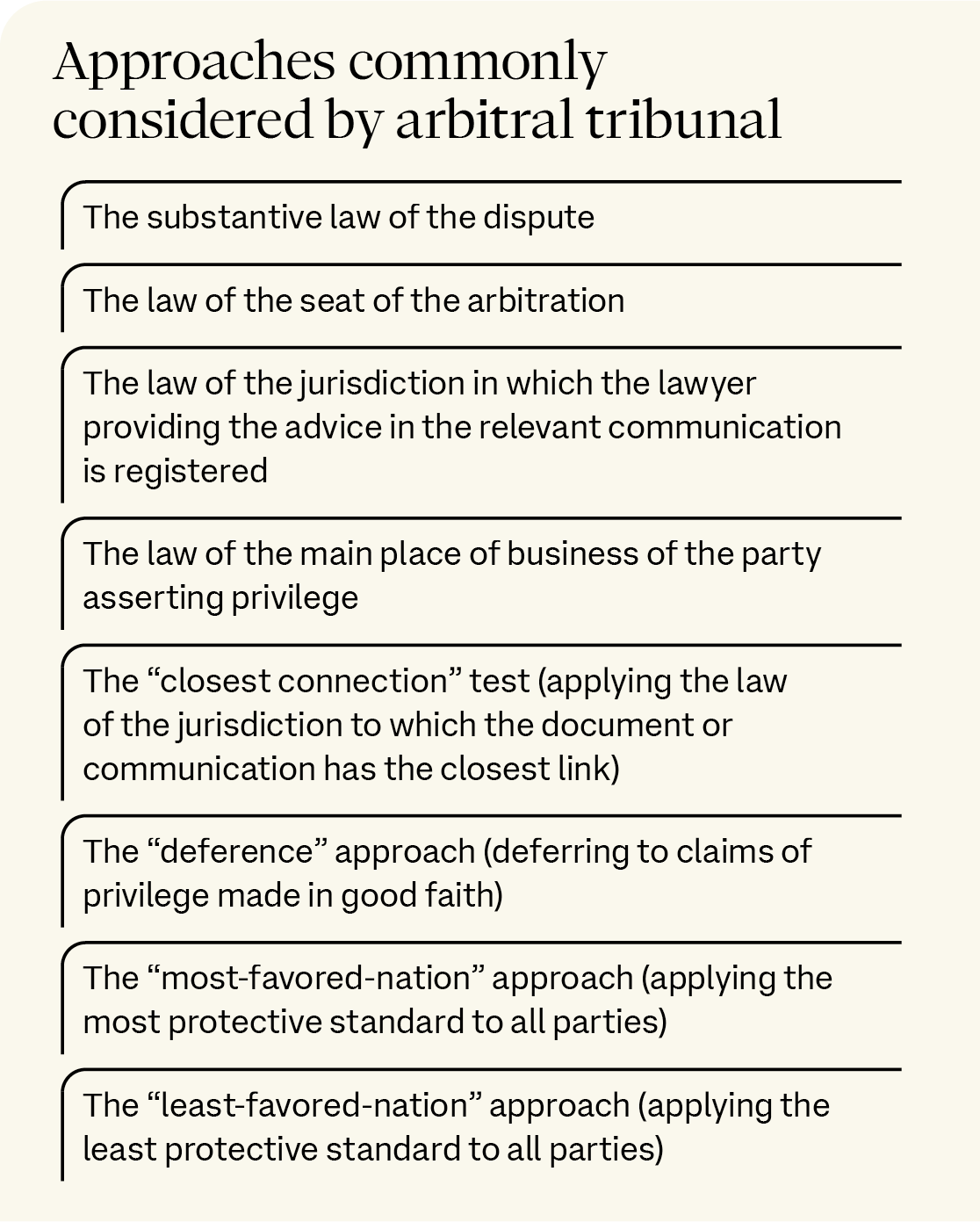International arbitration in 2025
Privilege in arbitration – should one set of rules apply?
By Christophe Seraglini, Patrick Schroeder, Hinda Rabkin, Guy MacInnes-Manby and Katherine Khan
In brief
International arbitration offers a neutral forum for resolving disputes between parties from different jurisdictions. It is common for parties, their counsel, and the tribunal to come from different jurisdictions, with the seat of the arbitration often differing from the substantive law governing the dispute.
While the international nature of arbitration is a key advantage, it also introduces complex challenges. One common challenge arises during document production: whose rules of privilege should apply?
Title
Why is privilege relevant?
Privilege issues typically emerge during the document production phase. The applicable privilege rules can be key to how the document production exercise is undertaken. Privilege protects documents that a party would otherwise have to disclose. Incorrect application of privilege by arbitral tribunals may jeopardize the integrity of the award.
![]() With arbitrations arising out of increasingly complex contracts and transactions involving parties, lawyers and arbitrators coming from across the globe, legal privilege can lead to lengthy debates at key phases in the proceedings. Acknowledging the existence of conflicting rules and addressing them early can only help to save time and money and ensure the smooth running of an arbitration for all of those involved.
With arbitrations arising out of increasingly complex contracts and transactions involving parties, lawyers and arbitrators coming from across the globe, legal privilege can lead to lengthy debates at key phases in the proceedings. Acknowledging the existence of conflicting rules and addressing them early can only help to save time and money and ensure the smooth running of an arbitration for all of those involved. ![]()
Christophe Seraglini
Partner
Various jurisdictions can take very different approaches to what constitutes privileged information. A common example is the treatment of communications involving in-house lawyers. In common law jurisdictions like England & Wales and New York, and certain civil law jurisdictions like Brazil and Spain, privilege extends to these communications. Conversely, civil law jurisdictions like France and Germany do not recognize such privilege.
Most arbitration rules are silent on the issue of privilege, with notable exception, perhaps unsurprisingly, of the International Centre for Dispute Resolution (ICDR) Rules, the international arm of the American Arbitration Association. The parties can agree at the outset on which rules of privilege will apply, but this rarely happens in practice. As a result, privilege issues may give rise to extensive procedural debates during the arbitration. Such disputes can disrupt the proceedings and increase costs, requiring the tribunal to intervene and resolve the matter.
How to determine which rules of privilege apply?
There is little express guidance as to how arbitrators should decide on which privilege rules should apply. Several approaches are commonly considered, including:

The lack of a consistent approach leads to uncertainty, which can be detrimental. For example, it can disrupt attorney-client communications as parties may be unsure of whether such communications will be protected by privilege.
Additionally, multiple privilege rules could apply simultaneously, depending on the approach adopted. This can lead to unequal footing between the parties. For example, applying the law of a party’s principal place of business might compel one party to disclose documents prepared by in-house counsel, while allowing the other to assert privilege and withhold similar documents.
The IBA Task Force on Privilege recommends uniform guidelines
In 2021, the International Bar Association (IBA) Arbitration Committee launched a task force to assess the desirability and feasibility of uniform privilege rules. The IBA task force published its report in 2024.
The task force concluded that it was desirable to establish uniform guidelines on privilege to bolster consistency and predictability. Such guidelines would also improve efficiency by reducing the time spent by parties arguing over applicable privilege rules.
The task force looked at six categories of privilege to decide whether uniform guidelines could be established: (i) legal advice, (ii) litigation privilege, (iii) national security, (iv) settlement privilege, (v) common interest privilege, and (vi) privilege against self-incrimination. After canvassing many jurisdictions, the task force found it feasible to establish uniform guidelines for three categories: (i) legal advice, (ii) litigation privilege, and (iii) settlement privilege. These three categories of privilege are widely recognized across jurisdictions as deserving of protection, despite some differences. The other categories were treated too disparately across the jurisdictions to allow for any uniformity.
The IBA task force recommended that the IBA Arbitration Committee prepare and adopt uniform guidelines for the three feasible privilege categories. It also recommended adopting choice-of-law guidelines for privilege categories not covered by the uniform rules. These recommendations are currently being considered by the IBA Arbitration Committee.
Uniformity in privilege: the road ahead for international arbitration
Adopting new guidelines on privilege will enhance certainty for parties in arbitration. Parties may expressly adopt these guidelines at the outset of arbitration or use them as a soft law reference. Existing IBA Guidelines, such as those on arbitrator conflicts and the taking of evidence in arbitration, are frequently used by parties in arbitrations in these ways, fostering a more uniform approach to this issue.
Developing new guidelines on privilege will take several years, after which counsel will need to carefully evaluate them before agreeing to their application. These guidelines are unlikely to resolve all issues relating to privilege, since requirements under national jurisdictions – such as ethical obligations to withhold privileged documents – will continue to apply.
Looking ahead
Until the IBA guidelines on privilege are published, varying approaches to privilege will continue to be debated and applied in international arbitration. Tribunals may resort to the current IBA Rules on the Taking of Evidence, though their guidance on privilege is limited. Parties should recognize that privilege in international arbitration may differ significantly from their expectations, in particular if parties are used to common law practices. In some cases, privilege may be significantly different or almost non-existent.
To enhance certainty, parties and tribunals could consider addressing privilege issues early in the proceedings (for example, in Procedural Order No. 1) to prevent disputes from arising during the document production phase.
Our global arbitration network is uniquely positioned to advise on privilege across diverse jurisdictions. We can assist proactively, helping you identify which communications will be protected by privilege.
- Introduction
- 1. AI in international arbitration: a fast-evolving landscape
- 2. Geopolitical shifts: new political agendas driving investment treaty claims
- 3. Russian disputes and anti-suit injunctions: arbitration and state courts - allies, adversaries, or both?
- 4. Investor-state mediation: a bridge over troubled waters?
- 5. Human rights and social issues in investment treaty arbitration: a growing trend
- 6. Arbitration as a tool for private capital disputes
- 7. Arbitration of space disputes: time for take-off
- 8. Game-changing sports disputes: a new normal
- 9. Privilege in arbitration – should one set of rules apply?
- 10. The shift from EPC to EPCM: a recipe for more complex arbitrations?
- 11. The internationalization of arbitration in Brazil: a rising trend
- 12. Shifting sands: the Middle East’s evolution into an arbitration hub




